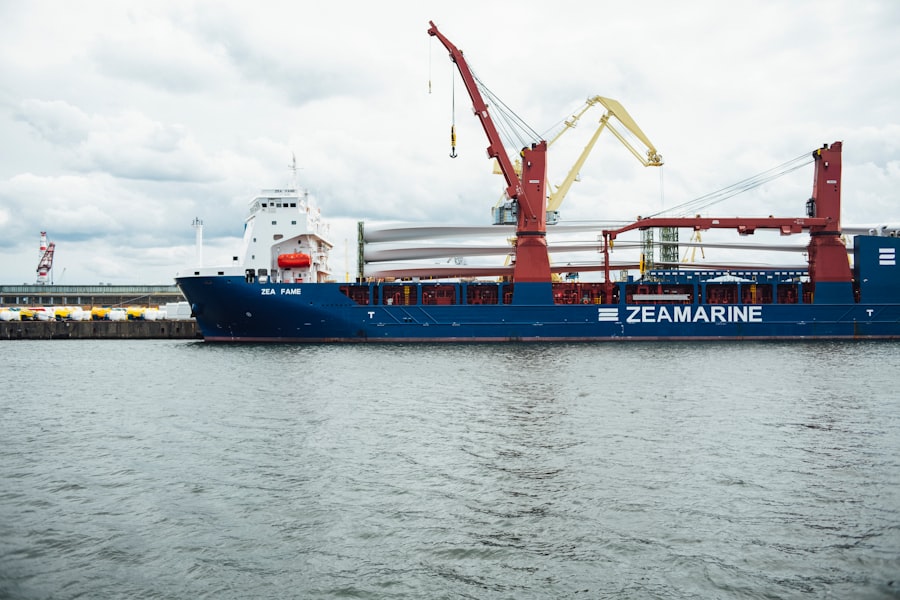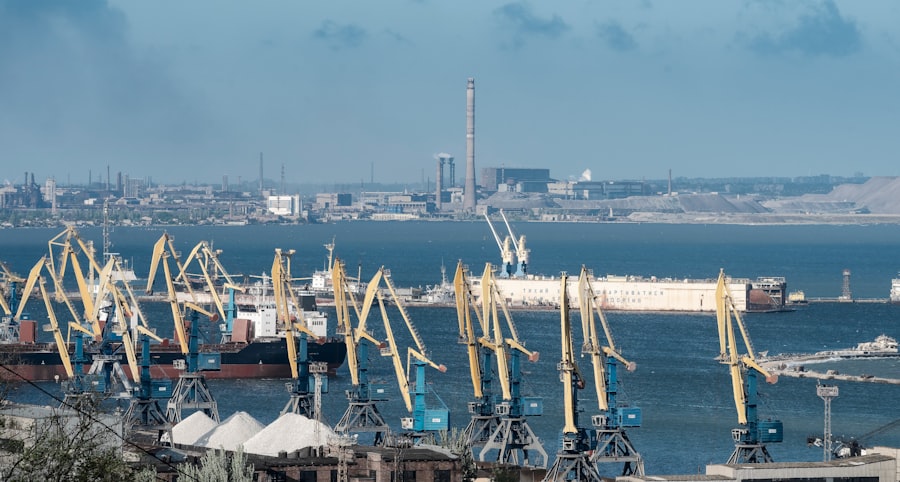
The global economy is a complex and interconnected system that encompasses the production, distribution, and consumption of goods and services across the world. It is influenced by a myriad of factors including international trade, financial markets, geopolitical events, technological advancements, and government policies. The global economy is characterized by interdependence, where the actions of one country or region can have far-reaching effects on others.
This interconnectedness has been further amplified by globalization, which has facilitated the flow of capital, labor, and information across borders. Furthermore, the global economy is subject to constant change and evolution. Economic cycles, such as booms and recessions, are a natural part of the global economy, and they can have significant impacts on businesses, consumers, and governments.
Additionally, the global economy is influenced by a wide range of macroeconomic indicators such as GDP growth, inflation rates, unemployment levels, and exchange rates. Understanding these complexities is crucial for businesses and policymakers as they navigate the challenges and opportunities presented by the global economy. The global economy is a multifaceted and dynamic system that is shaped by a wide range of factors.
It is characterized by interdependence, constant change, and the influence of macroeconomic indicators. Understanding these complexities is essential for businesses and governments as they seek to thrive in the global marketplace.
Key Takeaways
- The global economy is a complex and interconnected system that is influenced by various factors such as trade, finance, and geopolitics.
- Navigating the global economy presents challenges such as currency fluctuations, trade barriers, and geopolitical tensions that can impact businesses and economies.
- There are opportunities for growth and expansion in the global economy, including emerging markets, technological advancements, and global supply chain integration.
- Mitigating risks in the global economy requires strategies such as diversification, risk management tools, and contingency planning to protect against market volatility and geopolitical instability.
- Technology and innovation play a crucial role in the global economy, offering opportunities for efficiency, productivity, and market expansion for businesses.
- Government policies have a significant impact on the global economy, shaping trade agreements, regulations, and economic stability that can influence business operations and market dynamics.
- Building resilience and adaptability is essential for businesses to thrive in a dynamic global economy, requiring strategic planning, flexibility, and the ability to respond to changing market conditions.
Identifying Key Challenges in Navigating the Global Economy
Navigating the global economy presents a myriad of challenges for businesses and governments. One of the key challenges is managing geopolitical risks. Geopolitical events such as trade disputes, sanctions, and political instability can have significant impacts on the global economy.
Businesses must carefully assess these risks and develop strategies to mitigate their potential effects on their operations. Another challenge in navigating the global economy is managing currency fluctuations. Exchange rate volatility can impact the competitiveness of businesses in international markets and affect the value of cross-border transactions.
Businesses must develop hedging strategies to manage currency risk and protect their bottom line. Furthermore, regulatory compliance is a significant challenge for businesses operating in the global economy. Different countries have varying regulations and standards related to trade, taxation, labor, and environmental practices.
Navigating this complex regulatory landscape requires businesses to invest in compliance programs and legal expertise. In conclusion, navigating the global economy presents challenges related to geopolitical risks, currency fluctuations, and regulatory compliance. Businesses must develop strategies to manage these challenges effectively in order to thrive in the global marketplace.
Exploring Opportunities for Growth and Expansion in the Global Economy

Despite the challenges, the global economy presents numerous opportunities for growth and expansion. One such opportunity is accessing new markets. Globalization has opened up new markets for businesses to explore, allowing them to reach a larger customer base and diversify their revenue streams.
By expanding into new markets, businesses can capitalize on growing consumer demand and take advantage of lower production costs in certain regions. Another opportunity in the global economy is leveraging technological advancements. The digital revolution has transformed the way businesses operate, allowing them to streamline processes, improve efficiency, and reach customers across the globe.
Embracing technology can enable businesses to innovate and stay ahead of the competition in the global marketplace. Furthermore, international collaboration presents an opportunity for growth in the global economy. Strategic partnerships and alliances with foreign businesses can provide access to new resources, expertise, and market knowledge.
Collaborating with international partners can also help businesses navigate cultural differences and regulatory challenges in foreign markets. In conclusion, the global economy offers opportunities for growth and expansion through accessing new markets, leveraging technology, and international collaboration. Businesses that are able to capitalize on these opportunities can position themselves for success in the global marketplace.
Strategies for Mitigating Risks in the Global Economy
| Strategies | Mitigation |
|---|---|
| Diversification | Investing in a variety of assets to spread risk |
| Hedging | Using financial instruments to offset potential losses |
| Risk Assessment | Regularly evaluating potential risks and their impact |
| Global Collaboration | Working with international partners to address risks |
Mitigating risks is essential for businesses operating in the global economy. One strategy for risk mitigation is diversification. By diversifying their operations across different markets and product lines, businesses can reduce their exposure to specific risks and improve their resilience to economic downturns.
Another strategy for mitigating risks in the global economy is developing robust supply chain management practices. Businesses must carefully assess their supply chains and identify potential vulnerabilities such as geopolitical risks, natural disasters, or supplier disruptions. By implementing contingency plans and building redundancy into their supply chains, businesses can minimize the impact of unforeseen events.
Furthermore, risk management tools such as insurance and derivatives can help businesses mitigate specific risks such as currency fluctuations or commodity price volatility. These financial instruments can provide businesses with a level of protection against adverse market movements. In conclusion, mitigating risks in the global economy requires businesses to implement strategies such as diversification, supply chain management, and risk management tools.
By proactively managing risks, businesses can safeguard their operations and maintain stability in an uncertain global marketplace.
Leveraging Technology and Innovation in the Global Economy
Technology and innovation play a crucial role in driving growth and competitiveness in the global economy. One way businesses can leverage technology is through digital transformation. Embracing digital technologies such as cloud computing, big data analytics, and artificial intelligence can help businesses improve operational efficiency, enhance customer experiences, and gain a competitive edge in the global marketplace.
Another way to leverage technology in the global economy is through e-commerce. The rise of online retail has transformed the way consumers shop and has opened up new opportunities for businesses to reach customers across borders. By investing in e-commerce platforms and digital marketing strategies, businesses can expand their reach and capitalize on growing consumer demand in international markets.
Furthermore, innovation in product development can drive success in the global economy. Businesses that invest in research and development to create innovative products and services can differentiate themselves from competitors and capture market share both domestically and internationally. In conclusion, leveraging technology and innovation is essential for businesses seeking to thrive in the global economy.
Embracing digital transformation, e-commerce, and product innovation can help businesses stay competitive and capitalize on opportunities in international markets.
The Role of Government Policies in Shaping the Global Economy

Government policies play a significant role in shaping the global economy. Trade policies such as tariffs, quotas, and trade agreements can have profound effects on international commerce. Businesses must closely monitor changes in trade policies and assess their potential impacts on supply chains, production costs, and market access.
Furthermore, fiscal and monetary policies implemented by governments can influence economic growth and stability on a global scale. For example, central banks’ decisions on interest rates and money supply can impact exchange rates and capital flows across borders. Businesses must consider these macroeconomic policies when making investment decisions or managing financial risks.
Moreover, regulatory frameworks related to labor standards, environmental protection, and intellectual property rights can also shape business operations in the global economy. Businesses must comply with these regulations while also advocating for policies that promote fair competition and sustainable practices. In conclusion, government policies have a significant impact on the global economy through trade policies, fiscal and monetary measures, and regulatory frameworks.
Businesses must navigate these policies effectively to thrive in an environment shaped by government actions.
Building Resilience and Adaptability in a Dynamic Global Economy
Building resilience and adaptability is crucial for businesses operating in a dynamic global economy. One way to achieve resilience is through scenario planning. By anticipating potential risks and disruptions, businesses can develop contingency plans that enable them to respond effectively to unforeseen events.
Another way to build resilience is through fostering a culture of innovation and continuous improvement within organizations. Businesses that encourage creativity and adaptability among their employees are better equipped to navigate changes in market conditions or technological advancements. Furthermore, building strong relationships with suppliers, customers, and other stakeholders can enhance resilience in the global economy.
Collaborative partnerships can provide businesses with access to resources, expertise, and support during challenging times. In conclusion, building resilience and adaptability is essential for businesses operating in a dynamic global economy. By implementing strategies such as scenario planning, fostering innovation, and building strong relationships with stakeholders, businesses can position themselves for long-term success in an ever-changing global marketplace.
In conclusion, navigating the complexities of the global economy requires a deep understanding of its interconnected nature, as well as proactive strategies for managing risks and seizing opportunities. By leveraging technology, adapting to government policies, and building resilience, businesses can thrive in an environment characterized by constant change and interdependence.
FAQs
What is the world economy?
The world economy refers to the global economic system that includes the production, distribution, and consumption of goods and services across countries and regions.
What are the major components of the world economy?
The major components of the world economy include trade, finance, labor, and resources. These components interact with each other to shape the overall economic landscape.
What are the key factors that influence the world economy?
Key factors that influence the world economy include economic policies, technological advancements, geopolitical events, natural disasters, and global market trends.
How does the world economy impact individual countries?
The world economy impacts individual countries through trade, investment, and economic interdependence. Changes in the world economy can affect a country’s economic growth, employment, and standard of living.
What are the major challenges facing the world economy?
Major challenges facing the world economy include income inequality, climate change, geopolitical tensions, trade disputes, and the impact of technological disruption on jobs and industries.
How do international organizations and agreements impact the world economy?
International organizations such as the International Monetary Fund (IMF), World Bank, and World Trade Organization (WTO) play a significant role in shaping the world economy through policy coordination, financial assistance, and trade regulations. International agreements, such as free trade agreements and climate accords, also impact the world economy by influencing trade flows and environmental policies.






